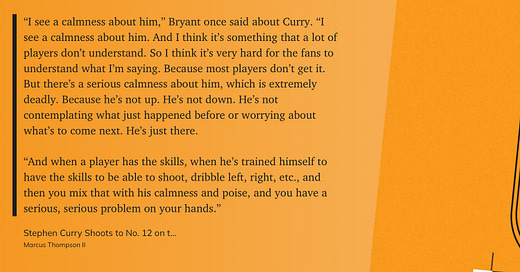When I was a (slightly) competitive athlete, the best thing I could do was keep my composure.
With a clear head on my shoulders, I was able to do my job better than just about anyone on my team - despite what I’d consider to be pretty underwhelming physical skills.
As I came up in sports, I spotted a pattern around this very process.
The best leaders and players had a quiet, killer instinct about them. It wasn’t the loud leadership you see promoted on TV, but a controlled energy, a clear sense that they were unshakeable.
Whether it was a GM, Head Coach, or Captain, the best were always under complete control.
Poise is perhaps the most powerful performance state we can enter (aside from flow, maybe).
When you’re fully present, immersed in the game, playing it moment-to-moment, and you execute your elite skill at a high level, you’re going to be borderline unstoppable.
That’s part of what makes Steph so special (the same is true for Kobe).
It's what allows the best to deal with the inevitable ups and downs of the game. Even as the best shooter the NBA has ever seen, Steph still "fails" with a missed shot more than he hits. This pattern is true across sports, even for the best athletes -- the rate of failure is always much higher than the rate of success.
Poise lets you deal with those failures with grace. It minimizes the downstream effects of the mistakes. It maximizes your opportunity to get it right the next time.
If you want to rise to the top of your field, you’re going to want to develop this kind of psychology.
In my view, developing such poise comes from:
1. Building your sense of agency. The more you feel responsible and capable of shaping the outcomes you deliver, the more poised you can be.
2. Clarifying what you can control, what you can influence, and what to ignore.
3. Training in presence. Like Kobe mentioned, the stillness comes from being fully present - which helps you get not too high or too low, but just right.
4. Having control of your effort. There’s a cliche in sports that you can only control your attitude and effort. But most people don’t realize just how much control they have over how hard they work. Being able to consciously raise your effort on demand (and relax on demand) gives you the ability to flex to the demands of any situation.
This list probably isn’t exhaustive, but reflects several key things you need to get right to have this level of domination.
So here’s what I’d suggest you do:
1. Rate yourself in each of these areas from 1-10.
2. Identify your lowest score.
3. Pick an action you can take to train it.
4. Get going.





